#characters are morally gray there are no heros their relationship in similarly not perfect but is also not inherently toxic etc etc
Text
You ever see a take about a piece of media that is just... so Fundamentally Incorrect that you genuinely start wondering if you actually managed to miss something in the source material because you cannot understand how the hell someone even got to that conclusion
#colore speaks#yeah i so spent like two or three hours tearing apart a Take i saw with my friends yesterday tore it apart it even more this morning#i am not going to get super into it because god i do not want to start shit but uh. people sure do have opinions on jonmartin huh#and people sure are incable of picking up on subtext and nuance and context huh#i am so tired man#characters are morally gray there are no heros their relationship in similarly not perfect but is also not inherently toxic etc etc#i need to write an actual analysis post on them at some point because my god do i have opinions and some people to prove wrong#tl;dr: shit is not black and white and never will be there is nuance and context in everything for love of everything please#my friends will know exactly what this post is about
9 notes
·
View notes
Text
Finally caught back up with the Invader Zim comic, and I have to say that Quarterly #2 is probably my favorite issue of the whole series and one of my favorite pieces of Zim related media.
Enter the Florpus did a lot to more thoroughly explore Dib and Professor Membrane’s relationship, specifically how Membrane’s kind of a shit parent because he refuses empathize with his son’s contrasting interests and morals. Issue #2 is clever by switching that dynamic on its head and acknowledging that Dib is similarly self-centered in his interests and struggles to empathize with others (though in the series, we see this a lot more with his relationship with Gaz than with his father) by putting Membrane in a situation that intentionally reflects Dib’s struggle to expose Zim as an alien.
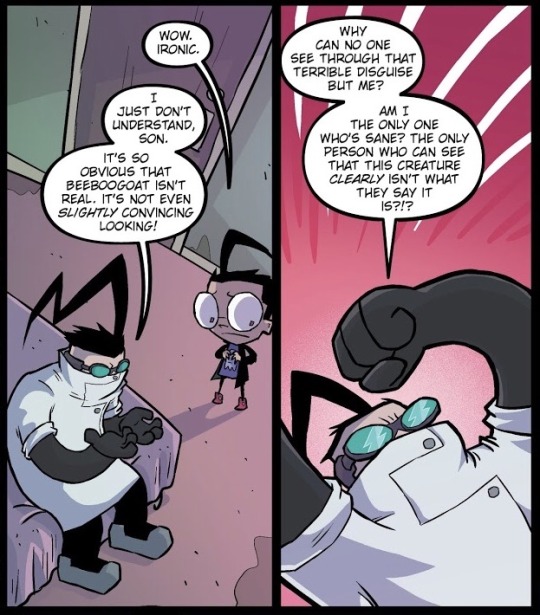
I feel like a lot of Invader Zim stories after the first season of the show go out of their way to portray Dib as being more of a sympathetic hero focused on defending humanity rather than the more morally gray rival who saw Zim more as a ticket to validation. Like, notice how Dib displays an almost disturbing obsession with dissecting Zim and having “his guts strewn on an autopsy table” in the first few episodes. That trait is all but gone by the series’ halfway point and almost never comes up in the comics, and I feel like that was done intentionally to make him more heroic. Whether you want to chalk that up to character development or flanderization is up to you, but I like it when we get reminders that Dib is still a pretty messed up kid who has a lot of flaws that he needs to work out too. He’s a victim of parental neglect and bullying for sure, but that doesn’t (and shouldn’t!) make him perfect.
Speaking of dissection, we also get a reminder that Zim is still horrified of being discovered and, well, dissected.

Zim’s fear of being discovered is where a lot of the series’ humor comes from, but it does raise the question as to why he’d be scared of the humans he looks down on as pitiful, inferior, stinky, etc., especially when he doesn’t seem to mind interacting with other alien races. While we can assume a lot of explanations (fear of being left stranded so far from the Irken empire, fear of violating Invader protocol, fear of failing his leaders), the one that’s presented in the show is that he’s scared of being torn apart by human scientists and locked in a dark lab for the rest of his life. Exactly like what Dib says he’ll do to him. Naturally, this fear was phased out as Dib became more of a sympathetic hero, which is a shame because said fear makes Zim a much more three-dimensional character. Reminders that he’s very scared of that fate add more to his character beyond “funny little green man.”
Also Zim jar
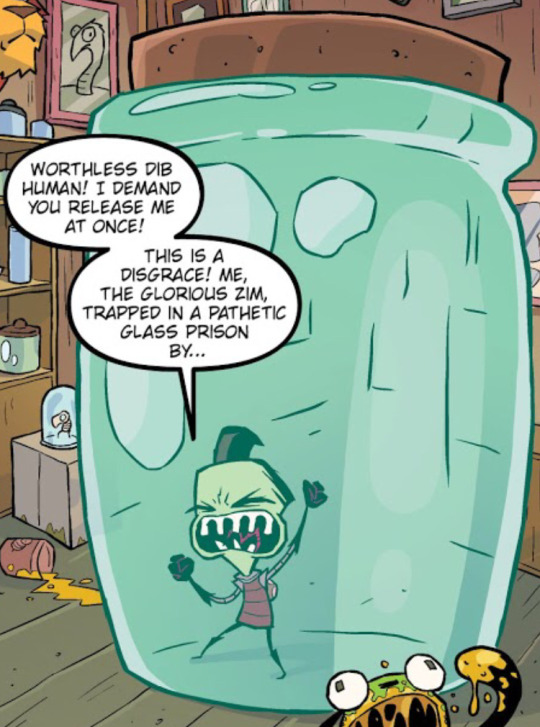
They totally knew what they were doing
226 notes
·
View notes
Text
Russian Fairy Tales Test Prep: Max Luthi

Max Luthi (1909-1991)
- Swiss literary theorist
- specialized in folk fairy tales of Europe, not Russia specifically
- published The European Folktale: Form and Nature (1947), first English translation published in 1981
- major three elements he discusses are one-dimensionality, depthlessness, and abstract style

I. One-Dimensionality
- magic is considered mundane; characters are not surprised by the existence of talking animals, enchanted objects, witches, dragons, etc.
- distance is created geographically, not magically. if you travel long enough (to the faraway mountains, to the thrice ninth kingdoms, to the heart of THE WOODS), you can reach your destination.
- a folk hero has no hesitation about marrying a supernatural/otherworldly bride; he notices nothing strange or disturbing about her. He is neither fearful nor curious about the numinous (that which is spiritual, religious, and/or mysterious).
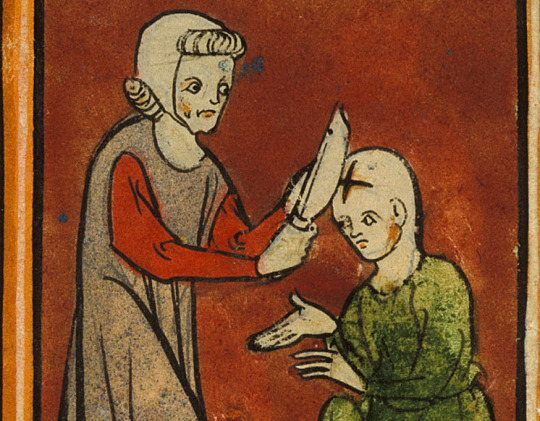
II. Depthlessness
- characters have no psychological depth. Their personality traits or sentiments are expressed via action. If there is a show of emotion, it’s typically either necessary to the plot or embellishment on the part of the storyteller.
- characters are fairly indifferent to the passage of time. They might age three years in the span of a sentence, but it doesn’t actually *change* them. Similarly, there’s no real development or character arc.
- characters don’t have willpower; their psychological motivations are expressed through external impulses (ex. a character who needs to stay awake all night will conveniently have thorns to sit in that prick him and keep him awake).
- “plot armor” protects the hero not only from death, but from incorrect actions. He will inevitably exhibit right conduct (not necessarily *ethical* or *appropriate* conduct). There are no moral dilemmas; the hero never feels reluctant or conflicted about the actions he must take.
- illnesses are non-descript and unspecified; injuries & mutilations are not perceived as horrific or disabling (ex. a hero might cut off his leg to feed an allied beast and this is not considered a hardship).
- the hero has no social environment. He is not embedded in a family structure or community; his relatives, friends, and allies appear or disappear as the plot dictates. If/when courtship takes place, there is no romance or affection in it.
- Relationships are typically symbolized by gifts, and magical gifts are used strictly “as needed.” Before & after the crisis point, the items are forgotten.
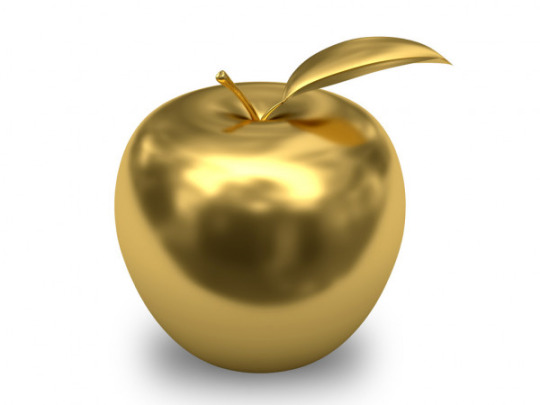
III. Abstract Style
- the stylistic means of achieving depthlessness; only the essential is mentioned.
- strict word-for-word repetition
- formulaic numbering (usually trebling) is more important than drama. Favored numerals are 1, 2, 3, 7, and 12.
- people/objects are described with a substance or a color (ex. “skin as white as snow”). as a rule, nouns receive one adjective.
- only a few things & persons are assigned a color. Folktales prefer clear ultrapure colors: gold, silver, red, white, black. Occasionally you will see gray, although it is likely to be associated with steel or iron. Now and then blue is mentioned. Green is rarely used {I have seen it mentioned once so far in my studies}.
- many things, both animate & inanimate, are described in mineral or metallic terms. Folktales prefer precious rare metals: gold, silver, copper.
- otherworldly beings frequently gift the folk hero with a means of transportation. He is essentially a wanderer and almost always sets out alone.
- otherworldly beings frequently live in solid houses, castles, or splendid underground lodgings (like people).
- drastic metamorphoses, abrupt & unexplained, illogical
- all extremes are welcomed, extreme contrasts in particular
- events happen when they are convenient for the story, which has a single sharply-defined plot line.
- characters have perfect timing; every time limit tends to be either used up exactly or exceeded by a narrow margin.
- minor characters are defined by their functions (ex. “messengers” exist for no other purpose)
- objects & situations fit together miraculously: clothing that seems tailor-made, a purse of gold that covers the exact cost of a needed item, arriving in precisely the right place, etc.
- hero is assigned very specific tasks with very specific solutions, but somehow he or his advisers always know exactly what needs to be done.
Gerhart Hauptmann: “Whatever one adds to the plot is at the expense of the characters.”
7 notes
·
View notes
Text
Overall, I'm satisfied with Attack on Titan's ending. It wasn't perfect, but it's not going to take away from the fact that the series as a whole is so darn close to a masterpiece.
Here are some things that I liked:
It did a fabulous job of tying together and finishing up Eren and Armin's arc. The conversation between kid Eren and kid Armin in the paths will probably end up one of my favorite moments in the series. As an Armin stan, I'm happy to see him emerge as the hero. I was also happy to see Eren as human again, it was really tragic to see him face all his guilt and his regrets.
I really love (in a twisted way) that tragic irony of Eren essentially being a slave to freedom. This panel right here:
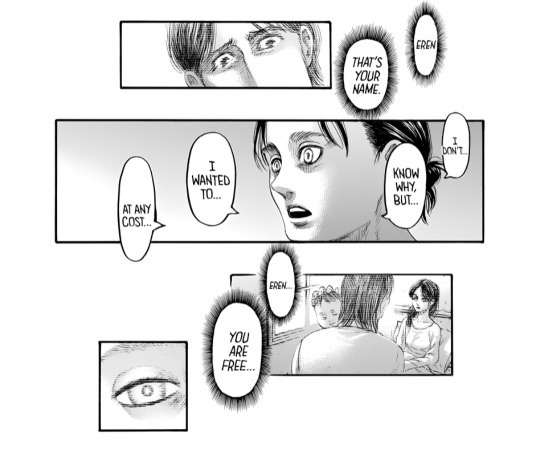
There's so much here. He's constantly said he is free, but is he? He's done terrible things and he knows it, he chose to become the bad guy and it's something he's shown clear remorse for. Yet he said he wanted to do it, but he's not sure why. I wonder if similarly to how past founding titans have been a slave to the will of the first king, has Eren become a slave to his own will? All he wants to do is live and die with Mikasa and Armin, yet he's cursed by his own child-like determination to acheive freedom, so much so that he never does.
It was neat they confirmed the theory that Eren spared Bertholdt from the smiling titan.
Jean and Connie are alive.. thank goodness
We got about as close to a happy ending as Isayama could have given us, it was nice to see everyone in the aftermath. I'm happy we got Armin and Annie together after the timeskip.
The parallels between the final panel and the first panel was a really nice touch.
I really appreciated how Mikasa became a major player in the end. It felt like she was pushed to the sideline for a while. These panels were beautiful and heartbreaking:
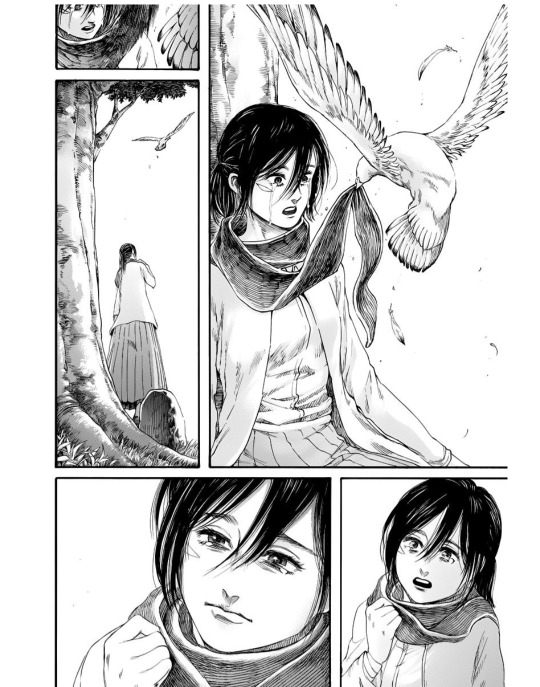
I actually really loved Mikasa's development at the end after I thought about it for a while. It led up like it was going to be some emotional moment where she kills Eren Jaeger and lets go of him when he has been somewhat of a curse for her. And in a sense it was. On the other hand, her killing Eren can be seen as an act of love and an act of loyalty. I never saw her loyalty to Eren as a flaw- of course you would want to protect the person who saved your life and the person you love to the best of your ability. The notion that her only trait is her loyalty to Eren is overblown anyway (let's not forget her relationships with Armin, Historia, Sasha, etc., and the fact that she was so quick to take charge and move on after she thought Eren died in season 1). Mikasa letting go of Eren would have been a betrayal to herself, but killing him was something she had to do. Her grieving in the final panels makes perfect sense.
As much as I loved it, there's a few things I didn't like:
What happened to the worm? It just, disappeared.
In fact, there's a lot of ambiguity as to what actually happened. Why did the titans turn back in the first place? Was that Eren's doing? Did the founder have the power to do that all along?
I thought Historia's baby was going to have a lot more significance within the plot. In fact, Historia's ending is the only characters ending I genuinely didn't like. It felt like she was going to be a lot more important than she was, but instead she's just chillin as the queen with her random ass husband that she hates. She deserved better. So did Ymir. God dammit.
The panels about the Eldian military didn't exactly sit right with me. Sure, titans are gone. But with the rest of the world crippled by the Rumbling, aren't we just in the same place we were before the Great Titan War with Eldia as the world's major power and everyone else just kind of at their mercy? After all the very clear anti-imperialist messages throughout the entire series, it makes me nervous how this can be interpreted.
It's a miracle this story even existed. Isayama is a phenomenal writer and Attack on Titan will always hold a special place in my heart. Eren Jaeger has got to be one of the most beautifully complex, morally gray characters ever written. It's almost impossible to write a perfect ending and there was bound to be some disappointment, but I'm satisfied with the way it ended. I'm so excited to see the rest of the story get animated. Thank you Isayama.
10 notes
·
View notes
Text
There are three big reasons I have not and don’t want to see Endgame ....
For one, I wrote a lengthy article about that will run in June at Sequential Tart (I'll update this post with the link when it goes live *EDIT* Here it is: The Subject of Character Death, Revisited - http://www.sequentialtart.com/article.php?id=3362 ). The other two, I'll talk about here; they involve Steve and Bucky.
I know what you’re thinking: Wolfie, how can you form an opinion on a movie you haven't seen? Well, I do have mental health issues (undiagnosed and untreated because I have no insurance or job, yay), so when the film was released in China, I found someone to spoil me so that I might make an informed decision as to whether or not I could *handle* seeing it, given some worries I had (and especially since 3 hours without a bathroom break was not going to work for me or my companion). I determined from that convo that it would be a Very Bad Idea for me to see the film.
Even seeing the constant posts about it -- especially ones that called it a “beautiful” or “perfect” end, etc. -- was triggering anxiety and mental anguish / circular thoughts (admittedly in part because there were similarly “bad” things happening in other fandoms of mine -- it was too much at once). And I'm STILL having massive issues with circular thoughts about it.
This essay isn't meant to tell anyone they’re wrong about how they perceive / feel about the film, BUT, while I know I shouldn't care what other people think, the sitch still makes me feel how I feel: frankly, a bit disturbed that people are loving things that are making me so awful. I feel like I've stepped into some sort of Bizarro world -- like I'm somehow in the wrong universe. It’s very distressing. (I mean ... they call it mental *illness* for as reason, right?)
In this franchise where I once found such great joy, I now find little more than anguish. It’s actually been making me physically ill to see the posts -- or to look on my massive Marvel collection; I've had to box much of it away for now. Hopefully some day I can enjoy it again. (I can't exactly stop using my $60 Captain America backpack I begged for, for my birthday, though. :/)
I find that when my thoughts get like this (like I'm on a runaway train that keeps revisiting the same stations), the only thing that helps even a little is to sort out my thoughts on the page -- even if I’ve done it before, as I have with this in the comments section of friends posts. (You may have seen other people express similar thoughts, too.) And really, I don't want to rain on my friend’s parades, so I figure I’ll post it in my own space, and then if people ask me my thoughts, I can just point them here. And hopefully this post will help others who are similarly struggling (I know there are at least a few).
As for the old chestnut “It’s just a story/ a fictional character”, well, for one thing, let me repeat: mentally ill here. If I could control how I feel, I wouldn’t BE mentally ill. But also, I'm a writer who feels writing is a sacred calling, so when I feel a story is badly told, I tend to take it personally. Yes, I know my opinion is not the be-all, end all -- if you think it’s a good story, yay for you. Me, I feel betrayed by this story in a way I have rarely felt before (the other biggest instance having happened the week before the film's release, so double-whammy, yay).
Warning: if you read any further, I assume you either saw Endgame or don’t care about Spoilers.
(*edited to add* If you need some solace too, check out @antiendgame to find other people who are upset.)
The first upsetting points for me were the Noble Deaths (and, in Loki’s case, lack of resurrection) -- I hate that trope with the fire of a thousand suns. But that’s what I wrote the article on (including how 2012 Loki’s escape doesn't make me feel any better), so no more on that here.
Now, let me preface the rest of this by saying no, I wasn’t expecting a romantic presentation of Stucky. And as hard as I ship them fanon-wise, I don’t actually hate Steggy -- I adore Peggy in her own right (and like the idea of them being a threesome with Bucky).
What I DO hate is that Steve abandoned Bucky for her.
Aside from Steve’s moral compass, Bucky was the impetus behind pretty much *everything* Steve did in his trilogy. He found the missing soldiers because Bucky was amongst them. Bucky’s death broke him -- and finding him again in Winter Soldier seemed to give Steve, who was clearly depressed, new life. Despite Sam insisting Bucky was Gone, Steve wouldn't kill Bucky to save the world. And in Civil War, Steve fought other dear friends, and was willing to throw away his own freedom, to protect his best friend. So how the FUCK is them being *separated pretty much forevermore* a satisfactory end to that story???????
TL;DR, the Captain America movies were about the repeated separation and reunion of Steve and Bucky … and yet we barely got to SEE them together before Steve said sayonara to the man he’d been best friends with for over a for over a decade, to go be with a woman he’d known for about a year.
A woman who’d already had a family without him.
Yeah, we can say her family still exists in the original timeline -- but I have seen soooo many different explanations of how the time sitch works out, it’s not even funny.
Really, that’s the third reason I don't want to see the movie: I HATE time paradox, and this movie sounds riddled with it. Also, as I understand it, the writers and the Russos are saying different things, with the Russos saying it’s a different timeline (which apparently Steve would be going *back* to after the shield pass, for some reason, and yeah, that bothered me, that he didnl't even give his best friend that momento, and sent their last onscreen moments together talking to SAM), and the writers saying no, the alternate timelines were only a thing when the Stones were in play. So yeah, Steve could spend the rest of his life with Bucky then ... but that means he also would have erased Peggy’s family (and maybe her work). Unless he was the man she married all along.
Either way, it would mean that Steve let Bucky suffer, and let HYDRA infiltrate SHIELD, neither being things I could see him doing.
And if it IS a branched-off timeline, I LOATHE that time theory, because it means NOTHING WE DO MATTERS. There’s always a version of us that’s our worst selves, and people who suffer because of it. That’s hella depressing. (Even if it would explain why I feel like I'm in the wrong world.)
At any rate, the ONLY end I really wanted was to see Steve and Bucky get to be together, no matter how -- “just friends” would have been fine. It was literally the thing I wanted most in the whole damn MCU franchise (aside from seeing Loki be redeemed and then fight alongside the Avengers. *sigh* At least I didn't have high hopes there ...). I would rather Steve had taken Bucky back in time WITH him, even if Steve still married Peggy; time paradox issues aside, I could have lived with that -- yes, even if it meant we didn’t get The Falcon and the Winter Soldier. (And honestly, how much am I supposed to look forward to that anyway, when Sam has been such an *inexplicably* uncompassionate asshole to Bucky in WS and CW? A guy who runs meetings for people with PTSD holds a grudge against a guy who was brutally mind-raped? It's like they made him OOC for the lolz!)
As for “Oh, but Bucky knew and he was okay with it!”
Uh, if he was okay with it, it's just because the writers *wrote* him that way for their own convenience, so they could do this ending. I have been besties with someone most of our lives. We broke up a few times, but we managed to keep finding our way back to each other. We don't live in the same state, so we rarely see each other, but at least we DO sometimes, and we write each other. If this person said they were going to go live somewhere with no way to communicate with me ever again, so they could be with someone they loved, of course I wouldn't want to say don't leave, because I'd want them to be happy, and wouldn't want to stand in the way … but that doesn't mean I'd be “okay”. in the slightest. And I wouldn't WANT other people I care about to go through such pain, much less think it beautiful to watch.
Plus, as I always say, this is fiction -- I don't need *that much* “reality” in my escapism. Temporary angst is my bread-and-butter -- it’s cathartic -- but I need a happy ending to be the payoff. To me, A TRULY happy ending for Steve -- and the one that would have been the best payoff for the narrative we’ve spent a decade watching -- would have been for him to not have to choose between the two people he loved most.
Edited 5/11/19 to add: For all those who are all “Oh, they’re just friends, they aren't gay”, I am more or less fine with sexual Stucky staying fanon; they still love each other platonically, are SOULMATES, ACCORDING TO THE SCREENWRITERS THEMSELVES (Christopher Markus and Steve McFeely), who wrote this as part of the intro to the graphic novel Captain America: White -
“…Of course, this is still a rollicking adventure tale, and no adventure is complete without a love story. And yes, these books have one – the longest, most tortured one in Marvel history, in fact. We’re talking about Steve and Bucky, without smirking or innuendo or raised eyebrows. Platonic though the relationship may be, from the meet cute to the tragic separation, their bond has all the elements of a classic romance. These two men love each other – as any pair of friends who faced exclusion, combat, inhumanity, and death would. Their bond stretches across half the twentieth century. The loss of it gnaws at Steve throughout the modern day, and it slices his heart in half when the Winter Soldier rears his tormented, homicidal head. Just as Jeph and Tim’s earlier Daredevil: Yellow, Spider-Man: Blue, and Hulk: Gray all dealt with the major love interests in the heroes’ lives, so too does Captain America: White. Steve and Bucky are each others’ soulmate, if you will, because no one on Earth understands what either of them has been through as well as the other does. The book deals deftly with the strengths and weaknesses that relationship engenders. As the Red Skull himself says to Bucky, “The captain has a … ‘soft spot’ for you. A spot I intend to put a bullet through this very evening.” Soldiers fight for their country. They fight for themselves. They fight for each other. And sometimes they die for these things, too. The ones who don’t carry the memory of the ones who did for the rest of their days. Steve Rogers is no different.”
So he's gonna leave his soulmate (no matter the nature of their love) behind forever? FUCK THAT NOISE. I am completely baffled ow two writers who see Steve and Bucky that way would go on to give them that ending.
And retouching the whole for Bucky “knows and is okay” thing, the Russos also said that Bucky is too damaged still to be Captain America. Uh, THAT DOESN’T SOUND LIKE THEY REALLY THINK HE’S OKAY.
#anti-endgame#endgame spoilers#avengers engame spoilers#avengers endgame#STUCKY IS MY OTP#stucky#steve/bucky#mine#my thoughts#2019#marvel cinematic universe#marvel#rant#Character Study#steve rogers/bucky barnes#Steve Rogers#Bucky Barnes#james bucky barnes#sorry for the rant#stucky support group
5 notes
·
View notes
Photo

Jo’s Notes: Insurgent
“Sometimes, if you want the truth, you have to demand it.”
After escaping an invasion and recovering from a murderous mind control, Tris and Tobias, along with refugee Abnegations and remnants of the Dauntless, flee the city to the Amity faction. In the second installment of Veronica Roth’s Divergent series, we learn more about the complicated history and relationships that created their current conflict. We also learn how Chicago might be hiding a deeper secret than anyone knows.
Starting Insurgent was starting into new territory. While I knew the story of Divergent (though not as well as I thought I did), I have all sorts of information to discover in this new volume. One such piece of information was the exact specifications of Tris and Tobias’ relationship. It might have been addressed in the first book, but this was when I first examine the age gap between the two. At first, I was a little put off (and maybe I still am), but I decided it wasn’t much of an issue since their society treats you as an adult by age 16. Similarly, they’re both in Dauntless, where I can see a similar relationship timeline to those who join the U.S. armed forces.
Insurgent allows the first look at the factionless as a legitimate group of people. The factionless exist as the city’s lowest class and they’re described as essentially homeless. They were the people those in factions did not want to look at and I bet no one understood the scope at which that population had grown. Thrusting that many people into poverty has to be a surefire way to create some government-toppling motivation. I also appreciated how the book took a look at how revolutions can get extreme and trade one evil for another.
Roth continues to give readers little hints that something isn’t right. I don’t want to call it foreshadowing exactly because I never feel the same sort of stress as I do with other instances of foreshadowing. I may not know what to call it, but I do know that I’m a fan of Roth for doing it. The specific instance in Insurgent that I love is the offhand way Tris says she thinks the bread tastes weird. Having grown up in bland Abnegation, you wouldn’t think it would be a problem. Then, we learn Amity is drugging their bread in order to promote peace among their people.
On that note, I think Tobias is just a little too calm when he learns the faction leaders are having to use inadvertent drugging in order to get people to uphold the faction’s values. Admittedly, he had a sort-of-drunk, sort-of-high Tris to deal with, but it still seemed like an issue he would have raised his voice at, minimum.
Another thing that makes this story so unique is how Roth breaks convention of what readers expect. Since Tris has been such a pivotal character in the political upheaval, we expect her to be appointed to Dauntless leadership. She’s been the mastermind behind a lot of the plans, why not give her the power to enact them? Except she refuses. It would have been too perfect - too Mary-Sue, even - for Roth to give Tris that position.
However, a person I was glad to see elevated to a leadership position? Cara. My mind was blown when one of Erudite people Tris saved used their extra time to do something brave. Then, to find it was Will’s sister, there’s a new layer added. Cara has more reason than Christina to hate Tris, so I would’ve expect her to run and leave Tris to deal with that mess. Not only did it break any assumptions I might have had, but it also showed how similar the siblings are; both Will and Cara exhibit bravery, but they were just different enough that Cara was Erudite and Will became Dauntless.
It doesn’t stop there, though. Roth brings back Cara and transitions her into another primary character. It felt like a natural transition that I believe was solidified when she was appointed a leader. Not just when she was appointed, but when Christina accused her of not really wanting to get involved “because you’ll break your glasses,” and Cara just SNAPS THEM IN HALF WITHOUT HESITATION. Capslock is the only sufficient way for me to express my adoration for this moment.
Another secondary character I wouldn’t have expected much from was Tori, the tattoo artist. I originally thought she was playing the part of the wizened wizard, a person that would guide our hero (Tris) but stay out of the primary fighting. However, she’s emerged with a quick wit and I would bet a quicker draw. Also, she arguably has the best one liners out of the entire series; not funny ones, the ones that cut people to their core and make them realize they’ve messed up.
As the struggle for power gets more twisted, so do the choices our heroic group has to make. There’s a lot of gray area they have to navigate and morals they start to question. When they hatch a plan almost exactly like what the Erudite did to the Abnegation in Divergent, they have to question if that makes it evil to begin. This made it feel like a warzone without having to gruesomely describe any carnage or bloodshed. However, it's still overwhelming and heartbreaking when Tris does take in the casualties.
It appears no aspect of Tris’ life can escape this tangling, because her relationship with Tobias is also becoming harder to navigate. Sitting next to my weird feelings about their age, the rapid acceleration of their relationship to a very mature level is something that kind of irked me, but not enough that I couldn’t make sense of it. I ended up deciding it was the more logical way of living given their society as well as the war zone that’s more or less centered on them; they don’t just have to consider themselves in their relationship. I did have to wrinkle my nose at the behavior they showed towards one another at some points, but it clears up in a more or less good way (for their situation, at least) as the books continue.
As their relationship grows, readers also get a less perfect idea of who we think of as Tobias. Specifically, I’m thinking about how Tobias is so concerned with not letting the past rule him that he won’t even consider the possibility of Marcus actually having important information. He won’t even listen to Tris, who he’s differed to on a number of occasions as being the brains of the two (though, I would argue Tobias is the common sense, so it’s even worse that he’s acting this way).
Lastly, the empty, spinning chair in Tris’ examination room was a big point of intrigue for me. I was sure it was going to end up being Mr. Eaton because I had an idea that Marcus was more evil than he let on. It would've been a one of the biggest plot twists I’ve ever read if Marcus and Jeanine were actually working together. However, it was an even bigger plot twist that it was Caleb, Tris’ brother, all along. We had been seeing him through Tris’ eyes as her big brother that she just wants to live up to. Then, we learn he chose to dropped his faction over be associated with something so corrupt and we trust him. We were wrong. To quote my notes directly, “FUCK that’s worse.”
The information we learn in Insurgent completely transforms the story I assumed we were getting in just reading Divergent. Nothing has a clear-cut answer and you feel the dire circumstances of the situation without it being over dramatic. Insurgent has drawn me entirely into the story Roth is telling. I am eager to know how such a complicated mess will resolve itself.
Rating: 4 / 5
2 notes
·
View notes
Text
rurouni kenshin ova: trust & betrayal (tsuiokuhen)
spoilers!! major spoilers!! if u watch it before u read this it’ll probably be better. but it’s up to u.

i first watched this series of four half-hour OVAs about 3 weeks ago, and i’m really still heartbroken. i’ve watched it another 2 times since, alone, in the dark, with good audio setups to honor its quality, and it’s lost none of its grace, beauty, or emotional impact. it’s easily one of my favorite anime works ever at this point, and i can confidently say that i think pretty much everything about it is perfect.
first, a short evaluation of the artistic quality of the piece. it’s phenomenal, imo. the visuals and animation are beautiful, lush, with a high degree of hand drawn craftsmanship. colors are used symbolically and strikingly, and the visual metaphors are rich- even techniques common to film, like expressing high emotion through scenes in nature, are used effectively and elegantly. the music is absolutely gorgeous, grand, majestic, orchestral; but so incredibly tender and sorrowful as well. it’s reminiscent of illustrative impressionist composers, ravel, debussy, and has the intensity of romantic ones, rachmaninov; or at least, those are the composers i found myself listening to as offshoots of the OST. i’m no expert on narrative techniques, but i found the pacing, characterization and development, everything about the storytelling to be fitting, effective, and impactful. the mood and tone are somber, but not necessarily bitter; it is dark, and depicts the brutal truth of war, killing, murder, death, and justice; but so, too, does it depict the humility with which ordinary people live their lives despite the suffering abundant in their world. it’s even structured a little similarly to a symphony, i think; the first movement is striking, and sets the tone for what is to come; the second movement extrapolates what is set in the first, and introduces tension, and promise; the third movement is romantic, and moving, the heart of the whole thing; and the fourth, the climax and the ensuing aftermath, the penance. i would definitely recommend this movie based on overall quality alone.
that said, several things in particular pique my interest in this film and the ways that they relate to patterns in my life: the concept of the supremely idealistic hero, who believes in justice but who is utterly gentle and naive; the similarities to the story of inuyasha and kikyo; and the intense appeal of romantic tragedy for me (and, maybe, you).
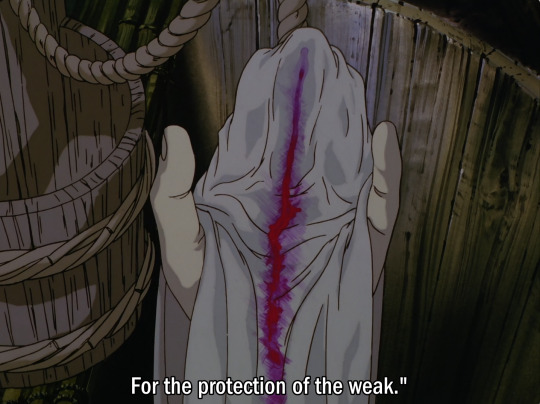
the idealistic hero. there’s a line in the film where kenshin’s mentor is thinking to himself about kenshin’s potential, and he thinks, (not verbatim, just what i remember) “he is pure. and because he is pure, he will continue to improve, as he is driven by the desire to become strong, to the point where i would consider him a simpleton.” and later, kenshin quarrels with his master about the morality of ignoring conflict and the suffering of the masses, when the principles that come with his strength dictate the a responsibility to protect the weak. i often find myself identifying with characters like this — characters who are idealistic and naive, who desperately believe in abstract justice, without any knowledge of the many gray areas in human morality and behavior, who ultimately wish to use their strength for the benefit of the anonymous “people.” i mean, pragmatically, it’s a ridiculous notion. how can one person decide what justice is for those he has the power to kill? who is he really protecting by doing so? and tomoe does a good job of pointing out the hypocrisy in his actions.
a bit on tomoe — she is a really interesting character to me. i’ve always had a fascination with the “tragic cold beauty” type that develops a warmer side to her, but for whom this warmer side is the cause of her tragedy. there are some quiet, subtle scenes where she looks at reflections of herself, which belie the undertow of her being at war with herself in those moments, where her intentions and desires are confused. she’s a powerful character, her power stemming from her contradiction. their relationship is built up over spare, poetic moments that belie a subtle, but intertwining chemistry, that is delicate and poignant as it is framed by the political instability and widespread turmoil of the times. she recognizes kenshin to be a child in his naivety regarding his ideals. her sorrow over the crops that die in the rain is just as palpable as kenshin’s despair over the antithetical nature of his killing. though her taking on the role of being a “sheathe” for the “brandished sword” of kenshin’s rage and anguish is founded on sexist expectations (that are still common today), she is not depicted as a weaker character by any means. different, and subordinate; but just as necessary, valuable and significant as kenshin, though ultimately she dies as a lesson to him- she serves her purpose beautifully, and then is burned away. they are brought together by death and lost love, and as the iris flower dies without the rain, and only her memory is left after the fighting dies down. she is a character trope that isn’t meant to live, as things that are too beautiful always wither away; she is meant to remain a memory, a reminder, a metaphorical and literal scar.

back to the idealistic hero. i think what attracts me so much to kenshin’s character in particular is the same as what makes tomoe fall in love with him: the so, so incredibly gentle nature of his spirit lying beneath his intense desire to do good in the world. a scene where kenshin and tomoe are together in the house they’ve escaped to, eating the vegetables they planted and harvested together, and tomoe mentions that kenshin’s everday could have been like this, if different things had happened in his life. the contrast between the peaceful life full of small happinesses that he could have had, and the brutal, violent, soul-crushing life he leads then — and the yearning i feel for the life he didn’t have, was very real. his “justice that seems like insanity” is haunting and beautiful, but i also want him to be happy. but his “justice” is detrimental to the gentle, kind person he truly is and wants to be. the idealistic hero can’t exist in the real world the way he thought he could; his shedding of naivety and realization than his only real strength is in protecting the people he cares about is sobering. ideals are abstract, but we live in a constantly shifting, unpredictable world that constantly changes like rippling water, and if we wish to live any semblance of a fulfilling life, we have to learn to not be a stone, which is eroded; but to flow along, carving out a space for ourselves within the tide.
these ideas are explored similarly in the manga series “Azumi,” wherein ax extremely strong, quick, genius assassin is a cheerful and loving girl at heart, who forms quick connections with people and only wants to be kind and have true friends. in this manga there is a theme of comparing her to a bodhisattva — a theme that i think is implied in the rurouni kenshin OVA as well. a bodhisattva is a figure from mahayana buddhism, a religion popular in east asia for a period of time (sorry i haven’t taken art history in a while!!), that has reached enlightenment but delays transcendence out of compassion to save other suffering beings. azumi and kenshin share the characteristic of being extremely powerful assassins, to the point of being like gods of war, or gods of death, who, because they are enlightened in their arts of fighting, cannot be allowed to form lasting connections with people they care about. anything they do form a connection with is killed and taken away from them, keeping them on the path of deified violence that they don’t really want (until, for kenshin at least, the war dies down and he swears to never kill again. i haven’t finished azumi so i don’t know what happens). (if any of this inaccurate please lmk, i’m not that knowledgeable about buddhism;;;)
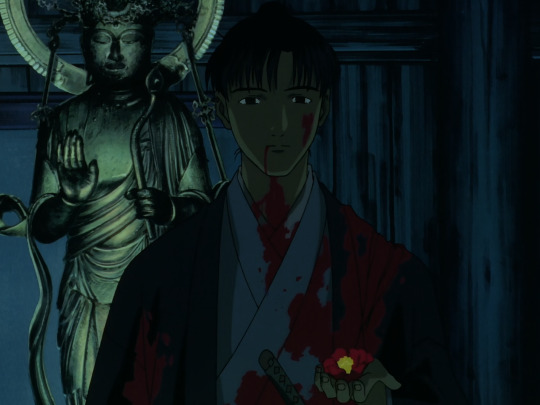
inuyasha and kikyo. inuyasha was a big part of my adolescence, and i think one of the series that really got me into anime in the first place. it’s not a great series honestly, in terms of artistic merit, but it’s plenty fun and full of surprises despite all its shortcomings. but i remember really liking the story of inuyasha and kikyo, and i see kenshin and tomoe’s story being compared to this in other places on the internet as well. the similarities are certainly there — the cold, long black haired conventional beauty meets violent demon, together they learn to be human and to love, which ultimately causes their downfall and the false betrayal and tragedy of the love that never was, which makes it all the more romantic.
the intense appeal of romantic tragedy — i want so desperately for them to be able to continue their lives happily together, yet at the same time i know that that would make for a bland ending (or maybe not. but,). the moment that breaks me isn’t the climactic moment of tomoe’s death, but the way that her spirit still comforts kenshin as he finishes the job started during the war, and carries his will to never kill again once it is over. the tragedy is what makes the love story so good; it wouldn’t be half as appealing without it, but it’s also what makes it painful. pain and sweetness, together, suffering and love, to feel pain is to feel love and that’s how you know, this is a theme in my life too though in different ways. maybe i just savor the feeling of being heartbroken, but not for myself. i want to feel tragic. i want to be saved. no one can save me in real life, but at least i can dream, project onto this immaculate story. there’s something really feminine about tragedy, for me. (i don’t consider myself a femme, necessarily, but if i had to choose i would lean femme, i think femininity of any kind is a thing to be treasured.) it’s something i felt when i was in the throes of identifying with mitski — she’s such a tragic character, branded in such earnest, genuine sadness and controlled despair. to hold the sorrow without the visceral pain, and peek into a feeling that’s meant to be desired. do i wax poetic? i can’t help it. i’m a romantic, through and through.

also, just another thing. i think another thing that makes the whole deal extra sweet for me is the effeminate appearance and nature of kenshin, haha. it’s certainly not trying to be ~queer~ or anything but it’s one of those things that, i feel like, resonate somewhere innately for those of us who seek out representations of people outside the cis/het norm. i’ve heard that fans of yuri tend to enjoy this series lol.
i honestly can’t think of anything this OVA could have done better. i think there might have been something but i can’t remember it anymore. if you have any thoughts, feel free to reach out~
10 notes
·
View notes